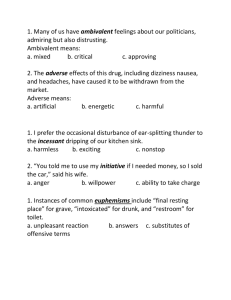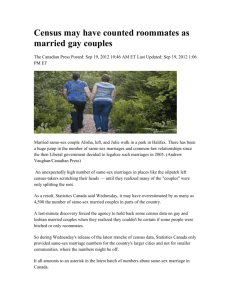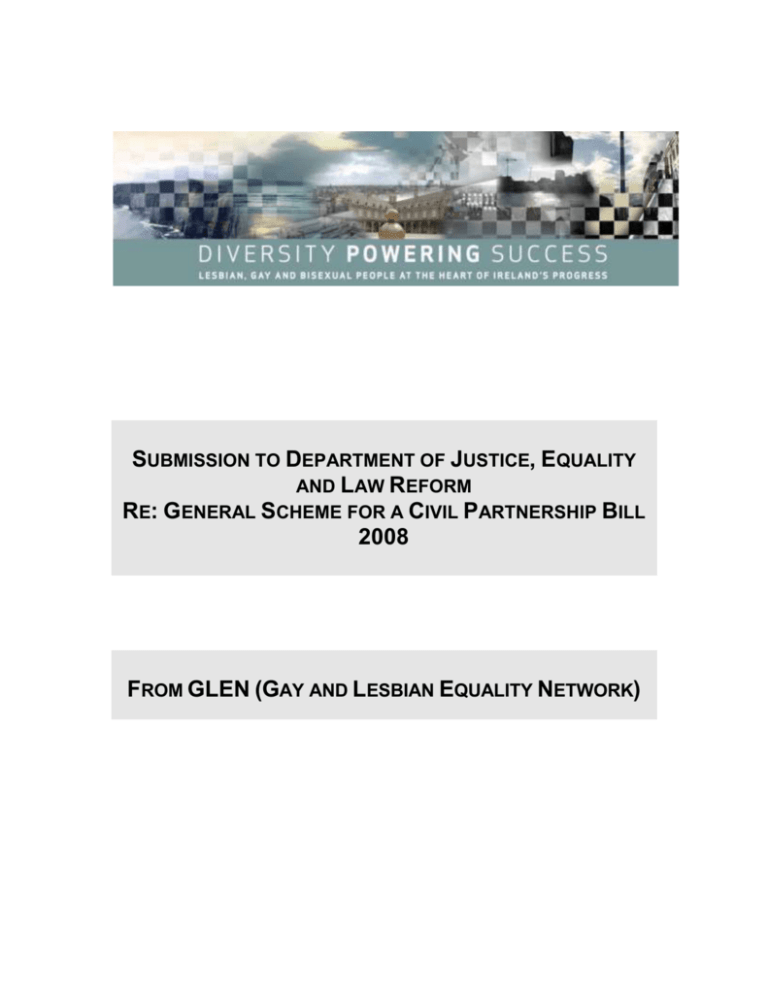
SUBMISSION TO DEPARTMENT OF JUSTICE, EQUALITY
AND LAW REFORM
RE: GENERAL SCHEME FOR A CIVIL PARTNERSHIP BILL
2008
FROM GLEN (GAY AND LESBIAN EQUALITY NETWORK)
1. Introduction.................................................................................................... 1
2. Extending Protections ................................................................................... 1
2.1 Parenting and Children .................................................................................. 1
2.2 Immigration .................................................................................................... 2
2.2.1 Implementing Equal Treatment in Immigration Regulations .................. 2
2.2.2 Citizenship and Nationality. .................................................................. 3
2.2.3 Facilitating Civil Partnership ................................................................. 3
3. Civil Partnership Follows Extensive National Dialogue and Growing
Public Support ................................................................................................... 3
3.1 Programme for Government .......................................................................... 3
3.2 All Party and Public Support for Legal Recognition ........................................ 4
3.3 Public Support for Change ............................................................................. 5
3.4 Extensive Analysis and Public Consultation by Policy Bodies ........................ 5
3.4.1 Colley Working Group .......................................................................... 5
3.4.2 Law Reform Commission Proposes Redress Scheme with Equality of
Access .......................................................................................................... 6
3.4.3 Conference on Legal status of Cohabitants and Same-Sex Couples .... 6
3.4.4 Equality Authority Recommends Access to Civil Marriage for SameSex Couples.................................................................................................. 6
3.5 Extensive Debates in the Oireachtas on Legal Recognition ........................... 6
3.5.1 Support for the Labour Party Civil Unions Bill 2007 .............................. 6
3.5.2 Joint Oireachtas Committee on the Constitution Proposes
Comprehensive Civil Partnership .................................................................. 7
3.5.3 Norris Bill on Civil Partnership .............................................................. 7
3.5.4 Green Party Publishes ‘Valuing Families’ Policy ................................... 7
3.5.5 Fine Gael Publish Proposals for Civil Partnership in 2004 .................... 8
3.6 Social Partners Support for Legal Recognition ............................................... 8
4. Background to GLEN..................................................................................... 8
1
1. Introduction
GLEN ~ Gay and Lesbian Equality Network ~ strongly welcome the proposals in
the General Scheme (Heads of Bill) of the Civil Partnership Bill and in particular
the proposals for a comprehensive registration scheme for same-sex couples.
Thousands of lesbian and gay couples throughout Ireland will be delighted that
they will have legal solutions to their urgent and real-life problems. Equally, their
families, their friends and their colleagues will also be delighted at this new legal
status.
Registered civil partnership will provide for substantive recognition of same-sex
couples in succession, domestic protections, pension provisions, maintenance
and immigration. GLEN also welcomes the public statement by the Minister for
Justice, Equality and Law Reform that equivalent provisions to spouses in tax
and social welfare will be delivered through associated changes in the Finance
and Social Welfare Acts.
Civil partners will also be protected against discrimination through amendments
to the equality legislation, representing a significant extension of equality
protections in the areas of employment and the provision of services.
The proposals however, do not provide for any significant legal recognition of the
needs of children being parented by same-sex couples. This is of critical
importance and GLEN urges the Government to address this gap during the
process for bringing forward the detailed legislation.
GLEN also strongly welcomes the proposals in the ‘Heads of Bill’ for a redress
scheme offering certain protections to cohabitants who do not marry or avail of
civil partnership and which will be provided to both opposite sex and same-sex
couples on an equal basis.
This submission is an initial response, focusing on the Heads of Bill. We highlight
two issues that have consistently been raised by lesbian and gay people as they
have the potential to lead to separation and loss: parenting/children and
immigration. We also summarise the comprehensive national dialogue and
analysis that has taken place on the issue of legal recognition of same sex
couples, including the very significant support for progress across all political
parties.
We look forward to making more detailed submissions when the Bill is published.
2. Extending Protections
2.1 Parenting and Children
A key area of concern for GLEN is that the proposed registered civil partnership
scheme largely treats civil partners as a self-contained unit with limited reference
to, or provision for any children that reside with and are dependent upon them.
This will seriously disadvantage children living in these situations. For example:
Under the proposals in the Heads of Bill, the terms “children” and
“dependent members of the family” have not been included in provisions
for dissolution. As a result, dissolution of a civil partnership can be
1
obtained without any requirement to specifically take into account the
needs of dependent children.
Equally, a child living with civil partners will not be able to claim
maintenance from the partner who is not his or her biological parent. This
contrasts with provisions under separation and divorce legislation relating
to civil marriage, where a spouse who has acted in loco parentis, and
has treated a child as a member of the family, will be obliged to pay
maintenance for that child.
Protections provided to civil partners in respect of the shared home make
no reference to the accommodation needs of children as a relevant
criterion.
Under provisions regarding succession, a child (or children) of the civil
partner who is not their biological parent will not have any legal right to
claim from that partner’s estate on death, unless that partner has made a
will in the child’s favour.
Civil partners, unlike married couples, will not be eligible to jointly adopt a
child (provision for joint adoption was proposed by the Colley Working
Group). Nor are there any other means through which the non-biological
parent can acquire guardianship rights, except where guardianship is
specifically willed by their partner in the event of their death.
It is difficult to see how these exclusions are in the best interests and welfare of
the children concerned.
2.2 Immigration
GLEN strongly welcomes the proposals in Head 28 that that the definition of
“member of the family” and “dependent” in the ‘Immigration, Residence and
Protection Bill 2008’ will include civil partners and that such family members or
dependents will be entitled to reside in the State, enter employment and have
access to education and training on the same basis as a citizen. This recognition,
when carried across to all provisions regarding family reunification and the
treatment of spouses/dependents, will represent an important advance for a
significant number of people. It will be of particular importance to many Irish
lesbian and gay people who live in, or wish to return to Ireland, but face the very
significant barrier that their non-EU partner cannot live and work here on the
basis of their relationship.
2.2.1 Implementing Equal Treatment in Immigration Regulations
It is our understanding that one of the difficulties in giving effect to Head 28 (and
hence providing for recognition of same-sex couples in immigration regulations)
is that there is very limited reference to the entitlements of ‘family member’ and
‘dependents’ in primary legislation in a general sense and the categories of
persons these definitions encompass.
This also appears to be the case in the new Immigration, Residence and
Protection Bill, where references to the entitlements of “members of the family”
and ”dependents” are specified under the rights of long-term residents and those
granted protection (Sections 36 and 50), but not in relation to provision for
migrants more generally (such as entitlements for Non-EU spouses and
2
dependents of Irish citizens). Section 127 for example, allows for the Minister to
make regulations specifying matters relating to entry and residence in the State.
Such matters include family circumstances and conditions for family reunification
(Section 127 (3)(e) and (4)(g)), but the scope of these terms is not defined.
Giving effect to Head 28 in this regard could be delivered through providing in
legislation that regulations pursuant to Section 127 of the Immigration, Residence
and Protection Bill, relating to family members for the purposes of family
reunification and recognition, provide for equal treatment of spouses, civil
partners and their dependents.
2.2.2 Citizenship and Nationality.
The Irish Nationality and Citizenship Act 1956 allows the Minister for Justice,
Equality and Law Reform to grant an application for a certificate of naturalisation
to the non-national spouse of an Irish citizen if satisfied that the applicant is, inter
alia, married to that citizen for a period of not less than 3 years. We would urge
that similar provision be made for civil partners.
2.2.3 Facilitating Civil Partnership
For many couples, for example, in situations where an Irish citizen is moving with
his/her non-EU partner from a country where no equivalent to Irish civil
partnership exists, it will be necessary to facilitate entry to Ireland of the non-EU
partner in order for them to enter into civil partnership. Provision could also be
made for registering a partner in a relevant Irish embassy/consulate.
Provision is already made to facilitate the entry of EU citizens and their non-EU
partners in “durable relationships duly attested” (as part of Ireland’s obligations
under the EU Free Movement Directive). However this does not cover Irish
citizens moving to Ireland with their non-EU partner.
As Ireland is one of the first countries in the world to have included sexual
orientation as a protected ground in its refugee legislation, it is important that this
progress is reflected in provision for family reunification of those granted refugee
status. This is likely to require a mechanism to reunite partners from countries
where homosexuality is illegal and where to publicly assert a relationship or to
put on record evidence of the relationship could lead to imprisonment or death.
3. Civil Partnership Follows Extensive National Dialogue
and Growing Public Support
3.1 Programme for Government
The Programme for Government 2007 committed to enacting civil partnership.
Specifically, the Programme states:
“This Government is committed to full equality for all in our society.
Taking account of the Options Paper prepared by the Colley Group and
the pending Supreme Court Case, we will legislate for Civil Partnerships
at the earliest possible date in the lifetime of the Government”. New
Programme for Government, 2007.
3
At the end of 2007, the Minister for Justice, Equality and Law Reform, Brian
Lenihan TD stated that given the urgency of the issues for many lesbian and gay
couples, it was no longer the policy of the Government to await the outcome of
the Zappone/Gilligan case before legislating on legal recognition. The Minister
committed to bringing forward the ‘Heads of Bill’ for civil partnership by early
2008.
3.2 All Party and Public Support for Legal Recognition
Proposals for legal recognition of same sex couples have a solid mandate with all
political parties having committed in their 2007 general election manifestos to
bringing forward legislation providing for such recognition.
Fianna Fail: “Based on our republican ethos and building on the agenda
for equality to which we are committed, we will address the need to
provide a legal framework that supports the rights of same sex couples,
including by extending State recognition of civil partnership between such
persons so that they can live in a supportive and secure legal
environment”.
(Manifesto 2007)
The Labour Party: “In Government Labour will reintroduce its Civil Unions
Bill. Partners in a civil union will have the same rights, privileges and
benefits and be subject to the same obligations, penalties and other
sanctions as those that apply to spouses in a marriage”. (Manifesto 2007)
Fine Gael: “will create a Civil Partnership Register to allow two people of
the same or opposite sex to formally register their partnership with the
State”. (Manifesto 2007)
The Green Party: “The Green Party will seek legislation that would
remove all gender specific terms from current legislation and regulations
governing the granting of marriages to allow same-sex couples to enjoy
the rights and obligations of civil marriage”.(Manifesto 2007)
The Progressive Democrats: “The Progressive Democrats will bring
forward a proposal for protection and fairness for unmarried persons who
are in long-term cohabiting relationships - regardless of the sexual
orientation (if any) of their relationship”. (Manifesto 2007)
Sinn Féin “strongly supports the rights of gay couples to marry and found
a family”.
In 2006, the then Taoiseach Bertie Ahern TD highlighted the need for and
Government support for legal change when he opened the offices of GLEN. He
stated:
“Sexual orientation is not an incidental attribute. It is an essential part of who and
what we are. Sexual orientation cannot, and must not, be the basis of a second
class citizenship. Our laws have changed, and will continue to change, to reflect
this principle”. (Former Taoiseach Bertie Ahern TD).
4
3.3 Public Support for Change
Successive opinion polls have consistently indicated strong public support for
legal recognition, including the full equality option for same-sex couples of
access to civil marriage. For example, in the most recent national Lansdowne
poll conducted by Marriage Equality in April 2008:
84% believed that same-sex couples should be allowed to marry or form
civil partnerships.
This comprised of:
58% who believed same-sex couples should be allowed to marry; and
26% who believed same-sex couples should be allowed to form civil
partnerships.
3.4 Extensive Analysis and Public Consultation by Policy Bodies
The proposals for civil partnership follow very extensive analysis, public
consultation and dialogue national level around the issues by a number of key
policy bodies.
3.4.1 Colley Working Group
Proposals for civil partnership draw, in particular on the findings of the Colley
Working Group which reported to Government in late 2006. The Colley Group
examined issues of legal recognition with regard to three main classes of
relationships: opposite sex, same sex and non-conjugal relationships, such as
those between two sisters or two brothers. It is clear from the analysis of Colley
that the issues are very different between each class of relationship and different
policy and legislative reforms were consequently proposed.
The Colley Group conducted extensive public consultation, including a public call
for submissions and hosting of a national conference on the issues.
The Group put forward just two options for same sex couples. Access to civil
marriage was identified as the full equality option for same-sex couples that
would underpin a wider equality for lesbian and gay people. The Group also
proposed full civil partnership, providing broadly equivalent rights and
responsibilities to civil marriage, as an immediately realisable and principled
option that would address pressing and urgent issues for same-sex couples.
The proposals in “Heads of Bill” accord with the full civil partnership option
identified by Colley, with the significant exception of any recognition of parenting
and children. The Colley Group had noted that many same sex couples were
parenting children (conceived for example through assisted reproduction or
through other arrangements) and that they and their children faced particular
difficulties due to the lack of legal recognition. To help address this situation, the
Group proposed that with the welfare of the child paramount, in principle samesex couples who enter full civil partnership should be eligible for joint adoption.
5
3.4.2 Law Reform Commission Proposes Redress Scheme with Equality
of Access
As noted by the Minister for Justice, Equality and Law Reform, the Redress
Scheme proposed in the “Heads of Bill” is in line with the proposals of the Law
Reform Commission which are focused on the difficulties and vulnerabilities of
unmarried cohabitants. The Commission proposed that the Redress Scheme
should be open to both opposite sex and same sex couples.
However, the Commission noted that same-sex couples were in a qualitatively
different situation than other cohabitants in that they couldn’t marry. With regard
to this issue the Commission did not make any proposals regarding marriage or
civil partnership for same-sex couples. Instead it noted the impending publication
of the Colley Group report and stated that any registration model proposed by
Colley would logically co-exist with the redress scheme that the Law Reform
Commission proposed.
3.4.3 Conference on Legal status of Cohabitants and Same-Sex Couples
In 2006 the Colley Working Group, the Equality Authority and GLEN jointly
hosted a major conference in Dublin entitled “Legal Status of Cohabitants and
Same-Sex Couples”. The conference was opened by the then Minister for
Justice, Equality and Law Reform, Michael McDowell, and involved family law
experts from Ireland and across the world including senior judges from Canada
and the UK. The conference provided an important opportunity for open
discussion and dialogue on the issues then being considered by the Colley
Working Group and by the Law Reform Commission.
3.4.4 Equality Authority Recommends Access to Civil Marriage for SameSex Couples
In 2002 the Equality Authority published its report “Implementing Equality for
Lesbian, Gays and Bisexuals”. The Authority proposed a broad legal framework
for recognition of same-sex couples, including access to civil marriage.
3.5 Extensive Debates in the Oireachtas on Legal Recognition
3.5.1 Support for the Labour Party Civil Unions Bill 2007
The introduction by the Labour Party of its Civil Union Bill for same sex couples
twice in 2007 made an important contribution to defining the issues involved in
advancing substantive legal change for lesbian and gay people. Although the Bill
was defeated, pending the introduction by the Government of its own proposals,
support for the principles of the Bill was expressed by members of all parties in
the Dáil.
“There is no lack of support from the Government for the provision of a
system of rights for same-sex couples. The core question today is not
whether greater rights, duties and entitlements should be available to
same-sex couples who choose to formalize their relationships, but how
best to enable this to occur”. Brian Lenihan, Minister for Justice, Equality
and Law Reform, Dáil Debate on Civil union, October 2007.
6
“Gay and Lesbian people are members of our families. They are sons,
daughters, brothers, sisters, nephews and nieces. They are our
neighbours, constituents and friends. It is not acceptable for them to be
treated differently or unfairly. The Government is committed to addressing
their needs in a fair and positive way” Charlie O’Connor, Fianna Fail, Feb
2007.
“This Bill or a similar one will soon become law and in future years we will
look back and wonder what all the fuss was about, as we have done on
other issues” Brendan Howlin, October 2007.
Gays must be treated as full and equal citizens of this Republic. Why
should legislators wait again for the courts to force us to legislate on this
issue? Gay weddings have attracted much attention and coverage in
other jurisdictions, perhaps because of their novelty. Significantly, the
dominant theme is of happiness and joy on the occasion not only for
those participating but also for their friends and relatives.
This is a matter of justice, equality and human rights. I and the Fine Gael
Party support this Bill. I urge the Minister to let it proceed to Committee
Stage and if there are imperfections, we can deal with them then on an
all-party basis. Charlie Flanagan, Fine Gael Spokesperson on Justice,
Equality and Law Reform, February 2007.
3.5.2 Joint Oireachtas Committee on the
Comprehensive Civil Partnership
Constitution Proposes
In January 2006, the All Party Oireachtas Committee on the Constitution issued
its report based on extensive public consultation, including a public call for
submissions and presentations to the Committee by a wide range of
organisations. The Committee recommended that civil partnership should be
provided for same-sex couples. The Committee noted that the balance of case
law suggests that:
“The Oireachtas may legislate to provide ‘marriage-like’ privileges to
cohabiting same-sex couples provided they do not exceed in any respect
those of the family based on marriage”.
3.5.3 Norris Bill on Civil Partnership
In 2005, Senator David Norris introduced a Bill for Civil Partnership in the
Seanad which provided for comprehensive recognition of same-sex couples. Civil
partnership, as proposed by Senator Norris, was open to opposite sex couples
also.
3.5.4 Green Party Publishes ‘Valuing Families’ Policy
The Green Party launched its Valuing Families document in October 2006, which
proposed opening civil marriage out to same-sex couples. It advocated a Bill
making all the terms associated with marriage gender neutral, thus facilitating
marriage for same sex couples.
7
3.5.5 Fine Gael Publish Proposals for Civil Partnership in 2004
Fine Gael is the first party to have proposed civil partnership when they launched
proposals for such a scheme in 2004. The Party proposed a registered scheme
(open to same-sex and opposite sex couples) which would have allowed for
rights and responsibilities in succession, next of kin, pensions, name change, tax,
social welfare, workplace entitlements and family home protection.
In the preface to the policy document proposing civil partnership, Senator Sheila
Terry, Fine Gael Spokesperson on Equality states:
“At present, gay people lack the tax, inheritance, guardianship and
property rights that those in heterosexual relationships take for granted.
What is more, gay people cannot even nominate a partner who they may
have been living with for decades, to act as their next of kin in case of
illness. It is established Fine Gael policy to allow for greater equality in
these areas. Ireland has come a long way in the last ten years, and for a
party of progressive centre views such as Fine Gael, these proposals are
the next logical step. For most people, they will be seen as simple
common sense”. Sheila Terry, Fine Gael.
3.6 Social Partners Support for Legal Recognition
Key social partners, including IBEC and Irish Congress of Trade Unions, have
articulated their support for legal recognition of same sex couples.
The National Economic and Social Forum (NESF) has welcomed the
commitment by the Government to legislate for civil partnership in the
Programme for Government (This is outlined its fifth Periodic report published in
July 2008).
The Forum had previously called for legal recognition of same sex couples in its
2003 report ‘Equality Policies for Lesbians, Gay and Bisexual People’. Legal
recognition, the NESF stated, would have the most practical and profound impact
on equality for lesbian and gay people.
4. Background to GLEN
GLEN ~ Gay and Lesbian Equality Network ~ is a national NGO promoting
equality for lesbian, gay and bisexual (LGB) people in Ireland. GLEN has funding
from the Department of Justice, Equality and Law Reform, the Department of
Health and the Atlantic Philanthropies.
GLEN’s five year Building Sustainable Change Programme was launched by
then Taoiseach Bertie Ahern TD in April 2006. The programme has a number of
key strands in promoting equality including promoting equality in legal recognition
of same-sex couples and families, addressing exclusion and harassment in
education, and the development of community infrastructure for the LGB
population. The Programme also aims to promote equality and inclusion in
employment.
GLEN has funding from the Department of Justice, Equality and Law Reform to
liaise with the Department on issues relating to LGB people and sexual
orientation relating to the NESF Report No.27. GLEN was represented on the
Colley Working Group established by the Minister for Justice, Equality and Law
8
Reform which proposed legislative options for Government on giving legal
recognition to, inter alia, same-sex couples.
Recent research that GLEN has published or in which it has been involved
include:
The National Economic and Social Forum (NESF) Report Number 27
Equality Policies for Lesbian Gay and Bisexual People: Implementation
Issues (2003). A comprehensive document based on consultations with a
range of Government Departments and State Agencies that recommends
how proposals contained in an earlier report ‘Implementing Equality for
Lesbians, Gay and Bisexuals’ published by the Equality Authority should
be implemented.
Implementing Equality for Lesbian, Gays and Bisexuals (2002).Report of
an Advisory Group on lesbian, gay and bisexual issues .
Education; Lesbian and Gay Students Developing Equal Opportunities
(1999). Reviews the problems faced and make recommendations for
change.
Poverty: Lesbians and Gay Men.; The Economic and Social Effects of
Discrimination (1995). Sets out the results of a comprehensive survey on
the nature and dimensions of discrimination. Looks at the risk of poverty
arising from discrimination and impact of discrimination.
9

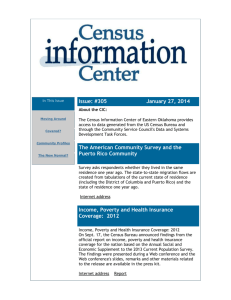
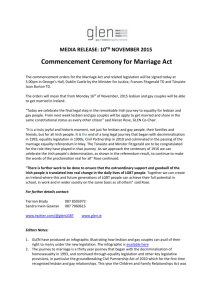
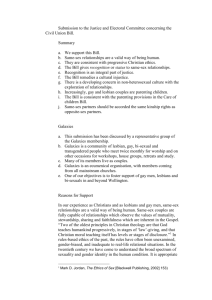

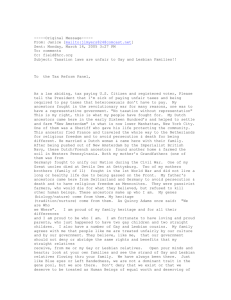


![Peter Collard [Details removed] Dear Sir and/or Madam National](http://s3.studylib.net/store/data/007613680_2-0e9d06f34ba7c7a5a822dec6a16b6bcf-300x300.png)
